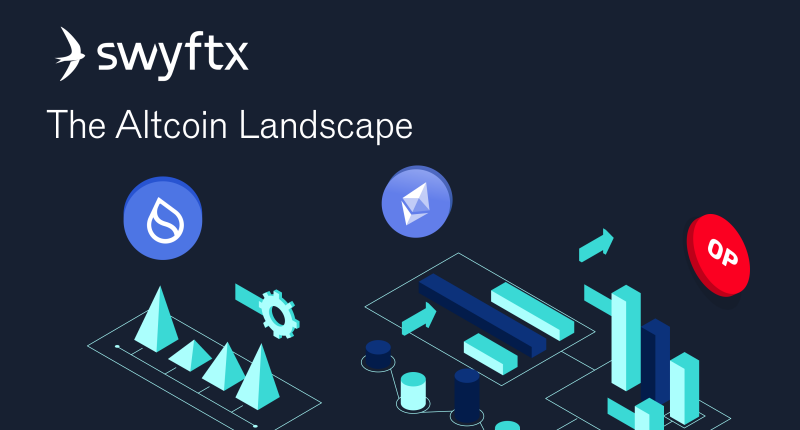To the naked eye, the crypto market can sometimes seem like it’s all memes, trolling, and hype.
But the blockchain’s grand plan has always been bigger than that.
Cryptocurrency wants to redefine finance.
And while the goal of Bitcoin and other digital currencies has evolved over the years, many new projects still work diligently on completing this mission.
And that’s where we enter the world of decentralised finance (DeFi) and tokenisation.
What is DeFi?
Decentralised finance encompasses a broad ecosystem of financial services powered by the blockchain. Unlike traditional finance, where money is backed by central authorities (banks, governments, asset managers), DeFi uses multiple servers – i.e., the blockchain – to secure finances.
This means no single entity is in charge of executing transactions, storing assets or collecting collateral.
Because there’s no intermediary, there are several advantages to financial services like borrowing and lending using DeFi.
Smart contracts
Smart contracts are the core of DeFi.
These are computer programs that execute when certain conditions are met.
For example, if the smart contract says, “Only pay out a dividend once a profit of $1,000 USD is reached,” that will happen every time.
This is how DeFi applications can perform transactions and other financial services without a middleman.
What is tokenisation?
Tokenisation has become one of the most compelling sub-sectors of the crypto industry.
It has experienced significant adoption across both Web3 and TradFi businesses since the onset of the 2020s.
Tokenisation essentially refers to assets represented by a token on the blockchain.
The most common example is stablecoins, digital currencies tied to an underlying fiat currency (for example USD or AUD).
But tokenisation has since blossomed to incorporate Treasury Bonds, stocks, and illiquid assets.
How can DeFi and tokenisation redefine finance?
DeFi
Because decentralised finance doesn’t require an intermediary to fulfil transactions, this reduces manpower costs. Additionally, it allows international settlements to occur 24/7, unlike the traditional stock market, which has opening and closing hours.
This is leveraged by DeFi platforms such as decentralised exchanges (DEXs) and lending platforms.
DEXs offer a huge range of altcoins for trade, lower fees than centralised alternatives (like Swyftx) and give complete control of assets to the investor.
Meanwhile, DeFi earning products can provide better yields for lenders compared to traditional institutions like banks or governments.
Providing faster, cheaper and more democratised access to financial services could see individuals and big businesses flocking to the sector.
Tokenisation
Tokenisation is set to play a big role in the future of finance.
Being closely linked with DeFi, they offer similar advantages – notably more financial efficiency (cheaper settlement and 24/7 markets).
The asset type has already flexed its muscles with BUIDL, a tokenised fund run by trillion-dollar asset manager BlackRock. BUIDL provides investors access to US Treasury bills via the blockchain.
Tokenisation is also valuable for typically illiquid physical assets, such as a car or real estate. Not only can this reduce transfer paperwork, it allows for fractional investment which can be more appealing for some.
Businesses could also benefit from tokenisation by using it to create more flexible and enticing loyalty programs for repeat customers.
Top DeFi projects to keep an eye on
Ethereum
The DeFi landscape has changed a lot over the past decade, but one thing remains true – Ethereum (ETH) is still the big dog.
Ethereum itself isn’t necessarily a DeFi project, rather, it’s the layer one network that powers the blockchain’s largest decentralised ecosystem.
The network has encountered issues with congestion and fees, seeing competitors such as Solana (SOL), Tron (TRX) and Avalanche (AVAX) grow in popularity.
Nevertheless, Ethereum’s wide-reaching community includes the biggest decentralised platforms and the most total value locked (TVL).
Uniswap
Uniswap (UNI) is a decentralised exchange powered by Ethereum.
It is one of the biggest DEXs in terms of trading volume and boasts over 2,000 trading pairs.
Users can leverage Uniswap’s fast and cheap transactions on a wide range of assets, or contribute liquidity to earn additional income.
Aave
Aave (AAVE) is a decentralised borrowing/lending platform.
DeFi users can contribute to lending pools to earn interest or borrow assets by providing collateral.
Aave also offers innovative finance features like flash loans and switching between fixed or variable loan rates.
Top tokenisation projects to keep an eye on
Ondo Finance
Ondo Finance (ONDO) is a tokenisation platform that offers on-chain versions of popular yield-bearing assets.
This includes OUSG, which provides access to short-term US Treasury yields.
Ondo Finance also manages USDY, another yield-bearing product backed by US Treasuries and bank demand deposits.
Chainlink
Chainlink (LINK) is a DeFi project with several branches, including tokenisation and interoperability.
The team made headlines in Australia when they partnered up with ANZ to produce Australia’s first bank-issued AUD stablecoin, A$DC.
Chainlink’s protocol was also leveraged by international payment giant Swift to improve interoperability among tokenised assets.
Swyftx: Start your crypto investing journey
Swyftx is an Australian-based crypto exchange with over 750,000 users. Start your investment journey off with $20 of free Bitcoin when you sign up and verify.

Disclaimer: The information provided by Swyftx is for general educational purposes only and should not be taken as investment advice, personal recommendation, or an offer of, or solicitation to, buy or sell any assets.
It has been prepared without regard to any particular investment objectives or financial situation and does not purport to cover any legal or regulatory requirements. Customers are encouraged to do their own independent research and seek professional advice.
Swyftx makes no representation and assumes no liability as to the accuracy or completeness of the content. Any references to past performance are not, and should not be taken as a reliable indicator of future results.
Make sure you understand the risks involved in trading before committing any capital. Never risk more than you are prepared to lose. Consider our Terms of Use and Risk Disclosure Statement for more details.








